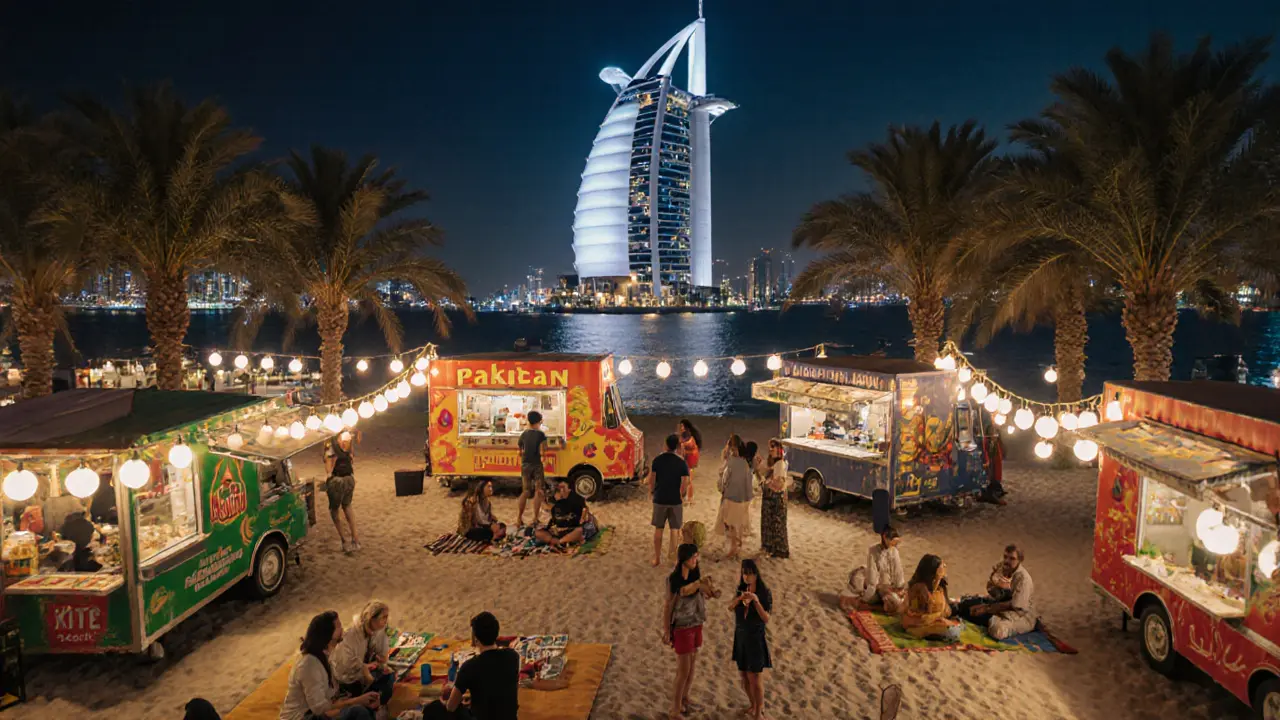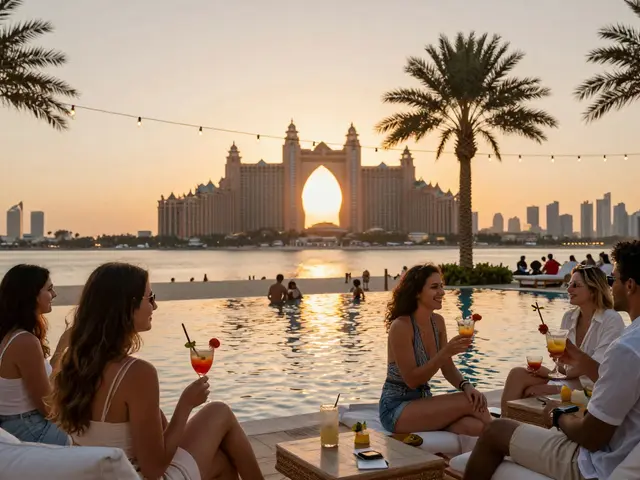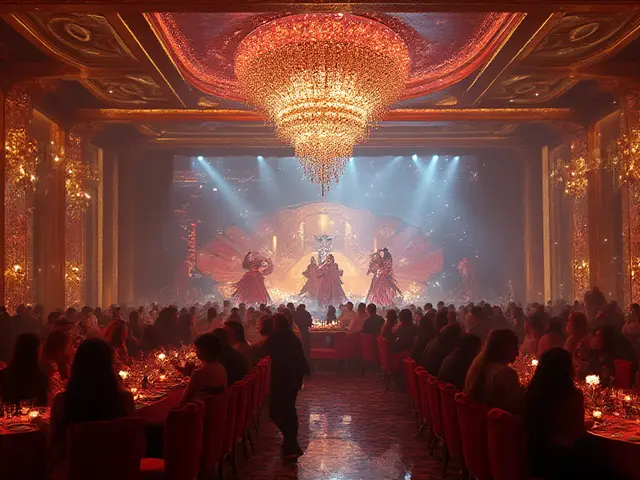In Dubai, the sun doesn’t just set-it transforms the city into a glowing playground of lights, scents, and sounds. While most visitors think of skyscrapers and luxury malls when they imagine Dubai, the real pulse of the city after dark beats in its Dubai night markets. These aren’t just places to shop. They’re cultural hubs where Emirati traditions meet global flavors, where the hum of haggling blends with the sizzle of grilled lamb, and where the desert breeze carries the scent of cardamom coffee and oud incense.
Where the Night Comes Alive: Al Fahidi Historical District
Start your evening at Al Fahidi, Dubai’s oldest neighborhood. By day, it’s quiet, with wind-tower houses and narrow alleyways. But as dusk falls, the district lights up with lanterns and pop-up stalls. The Al Fahidi Night Market, held every Friday and Saturday, is where locals come to unwind. You’ll find handwoven Sadou embroidery from Bedouin women, silver daggers (khanjars) made in Sharjah, and dates stuffed with pistachios from the Al Ain region. Don’t miss the traditional Arabic coffee stations-each cup is poured from a dallah, the iconic brass pot, and served with a side of Balaleet, a sweet vermicelli dish with eggs. This isn’t a tourist trap. It’s a living archive of Emirati heritage, curated by families who’ve been selling here for generations.Deira’s Spice Souk After Dark
While the Deira Spice Souk is open during the day, it becomes something else at night. The air thickens with the smell of saffron, cinnamon, and dried limes. Vendors here don’t just sell-they tell stories. Ask for ‘Habat al-Sudan,’ a rare black seed blend used in Emirati remedies, and the shopkeeper might hand you a small sachet as a gift. The stalls glow under string lights, casting amber shadows on piles of turmeric, rose petals, and frankincense imported from Oman. At the back of the souk, you’ll find a tiny stall serving Shawarma from a 30-year-old family recipe. It’s wrapped in thin bread, topped with tahini and pickled turnips, and costs just 12 AED. Locals line up here after work. Tourists? They’re still scrolling through Instagram.Global Flavors, Local Roots: The Dubai Night Bazaar at Kite Beach
Every Thursday evening, Kite Beach transforms into the Dubai Night Bazaar. This is where expats, tourists, and Emiratis mingle. Food trucks from Pakistan, Lebanon, and Thailand serve dishes with a Dubai twist: biryani with saffron-infused rice, shawarma with dates in the sauce, and matcha churros dusted with gold leaf. The music shifts from Arabic oud to Bollywood beats to deep house-no single genre dominates. You’ll see families on picnic blankets, couples taking selfies by the lantern arches, and groups of friends playing backgammon under palm trees. The best part? Entry is free. Parking is free. And the view of the Burj Al Arab lit up across the water? Priceless.
What Makes Dubai’s Night Markets Different?
Unlike night markets in Bangkok or Marrakech, Dubai’s markets operate under strict cultural guidelines. There’s no alcohol sold at any of these spots. No loud music after 11 PM. No revealing clothing-modesty is expected, even in the heat. But here’s the twist: that’s what makes them special. You’re not just shopping. You’re participating in a social contract. You respect the space, and the space respects you. The vendors don’t push. They invite. You might sit on a low stool, sip mint tea, and chat about the best time to visit the Dubai Miracle Garden. No pressure. Just connection.Practical Tips for Navigating Dubai’s Night Markets
- Go after 7 PM. The heat drops, the lights come on, and the energy shifts.
- Bring cash. Most small stalls don’t accept cards. ATMs are rare here.
- Wear light, breathable clothes. Evenings are warm, but the breeze off the sea keeps it comfortable.
- Don’t rush. Haggling is part of the ritual. Start at 60% of the asking price. If they say no, smile and walk away. They’ll call you back.
- Use the Dubai Metro. The Red Line stops near Al Fahidi and Deira. Avoid driving-parking is limited and traffic gets chaotic after dark.
- Check the Dubai Tourism calendar. Some markets are seasonal. The Dubai Night Market at Al Seef runs from October to March only.

Hidden Gems Most Tourists Miss
Head to the Al Seef waterfront promenade on a Tuesday. It’s quieter than the weekend markets, and the old abra boats still ferry people across Dubai Creek. At the far end, near the Dubai Heritage Village, there’s a single stall run by an elderly Emirati woman who makes Khubz Al Samour-thin, charred bread baked over coals. She only sells 50 pieces a night. If you’re there before 9 PM, you might get one. If not, you’ll be watching someone else eat it.Another secret: the rooftop terrace at the Al Fardan Exchange building in Bur Dubai. It’s not a market, but every Friday night, local artists set up stalls selling handmade ceramics, calligraphy, and oud perfumes. No crowds. No vendors shouting. Just soft lighting, live oud music, and the sound of the wind against the historic buildings. Locals call it ‘Dubai’s quiet heartbeat.’
Why These Markets Matter
Dubai’s night markets aren’t just about souvenirs or street food. They’re the last living spaces where tradition isn’t performed for tourists-it’s lived. In a city known for its speed, these markets move at the pace of conversation, not commerce. They’re where a young Emirati woman sells her grandmother’s perfume recipe, where a Filipino expat learns to make kunafa from a Syrian vendor, where a British banker tries his first date-filled baklava and ends up coming back every week.These places remind you that Dubai isn’t just glass and gold. It’s also spices, stories, and shared silence under the stars. If you want to know what Dubai really feels like after dark, skip the rooftop bars. Skip the clubs. Walk into one of these markets. Sit down. Say hello. Let the night unfold.
Are Dubai night markets safe for families?
Yes, absolutely. Dubai’s night markets are family-friendly by design. There’s no alcohol, no loud music after 11 PM, and security is visible but unobtrusive. Many families come with children to enjoy the lights, food, and cultural performances. Al Fahidi and Al Seef are especially popular with parents because the streets are pedestrian-only and well-lit.
Can I use credit cards at Dubai night markets?
Most small stalls only accept cash, especially in Al Fahidi and the Spice Souk. Some larger vendors at Kite Beach or Al Seef may take cards, but it’s not guaranteed. Always carry at least 200 AED in small bills. ATMs are rare in these areas, so withdraw before you go.
What should I wear to Dubai night markets?
Dress modestly out of respect for local culture. Shoulders and knees should be covered. Lightweight cotton or linen works best in the evening heat. You don’t need to wear an abaya or hijab unless you’re visiting a mosque nearby, but avoid tight clothing, shorts, or tank tops. Comfortable shoes are a must-many markets have uneven cobblestones.
Are Dubai night markets open every day?
No. Most markets operate on weekends only-Friday and Saturday nights. Al Fahidi and Deira Spice Souk are open nightly, but the full market setup with food stalls and live music happens on weekends. Kite Beach’s night bazaar runs every Thursday. Al Seef is seasonal, typically October to March. Always check Dubai Tourism’s official website for updates before heading out.
How do I haggle without being rude?
Start by smiling and asking, "How much?" Then offer 50-60% of the initial price. If the vendor says no, say, "I love it, but I can’t afford that." Walk away slowly. Often, they’ll call you back with a better offer. Never argue. Never insult the item. And never walk away if you’re not serious-you’ll damage trust. Haggling is a dance, not a battle.
If you’re looking for a different kind of Dubai experience-one that doesn’t involve elevators or champagne towers-these night markets are your answer. They’re where the city breathes, remembers, and connects. And they’re open, waiting for you, every evening.



